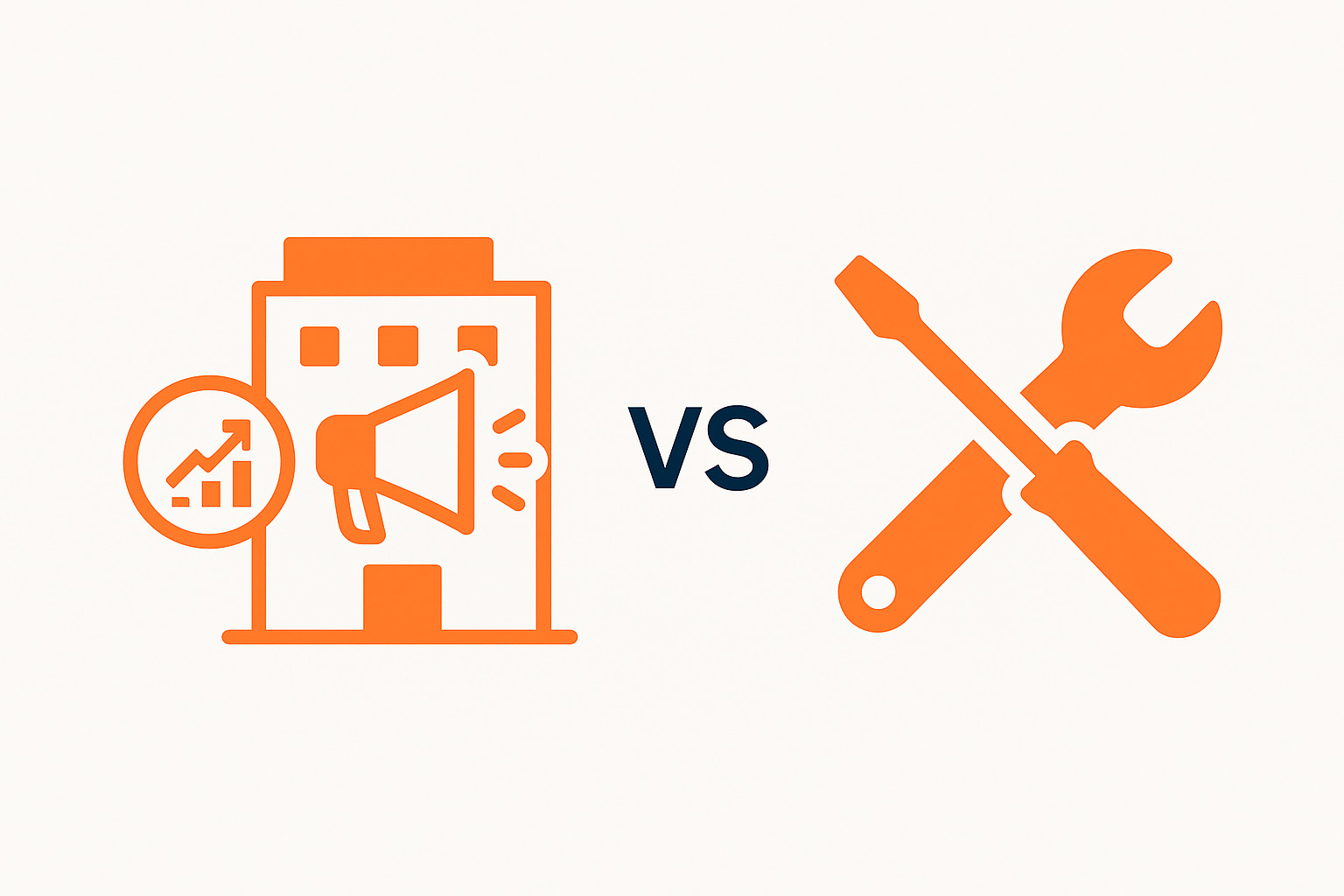Startup Marketing Agency vs DIY: Which Delivers Faster Growth in 2025?

Startup founders face an ever-evolving digital landscape marked by fierce competition and rapidly shifting consumer expectations. As we approach 2025, the pressure to drive sustainable growth while optimizing spend is higher than ever. Many founders ask: should we build our marketing efforts in-house, or should we invest in a marketing agency to accelerate results? The decision between a do-it-yourself (DIY) approach and leveraging a specialized startup marketing agency is pivotal, often determining how quickly a startup can scale, capture market share, and ultimately survive. With so much at stake, understanding the pros and cons of each path is essential for startup leaders who seek both strategic clarity and tangible results.
Understanding DIY Marketing for Startups
DIY marketing empowers startup founders and their teams to take full control of their growth strategies. By relying on self-service tools and platforms, startups can execute campaigns, analyze data, and iterate quickly, all without the overhead of agency fees. This approach appeals especially to early-stage companies that prioritize agility and cost-efficiency in their operations.
Recent trends underscore the growing inclination towards internal marketing efforts. In 2025, 71% of small business owners prefer using self-service marketing platforms over hiring a marketing agency. This statistic highlights the widespread belief among founders that digital tools are now sufficiently advanced to manage core marketing tasks independently. Platforms for social media scheduling, email automation, and analytics have become increasingly user-friendly, blurring the lines between professional and amateur marketing execution.
However, DIY marketing is not without its challenges. While it offers flexibility, it also places the burden of strategy, execution, and optimization squarely on the founder’s shoulders. Without the right expertise, the risk of misallocated budgets, ineffective campaigns, and missed growth opportunities increases. Over 90% of startups fail within the first 3 years, with 22% attributing failure to wrong marketing strategies. This sobering fact underscores the importance of not just doing marketing, but doing it well.
The Role of Marketing Agencies in Startup Growth
Marketing agencies offer startups access to specialized talent, advanced resources, and proven methodologies that can accelerate growth. By partnering with an agency, founders can tap into a diverse skill set—ranging from paid media and SEO to creative design and data analytics—without the need to hire full-time staff for each function. This can be particularly valuable for startups aiming to scale rapidly or enter new markets.
Industry data reflects the enduring value agencies provide. The global marketing agency market is projected to reach $600 billion by 2025, driven by growing demand for digital marketing services. Agencies are increasingly equipped to deliver comprehensive, cross-channel campaigns that can outpace DIY efforts in both reach and sophistication. Additionally, many agencies, such as Curio Revelio, offer flexible engagement models, including fractional teams and performance-linked arrangements, to align incentives and drive results.
Agencies bring strategic discipline and accountability to the table. Startups that invest over 10% of their capital in marketing reduce customer acquisition time by 25%. This evidence suggests that a well-resourced, agency-led approach can deliver measurable, accelerated growth when compared to underfunded or ad hoc DIY campaigns. Nevertheless, the challenge lies in finding an agency partner with the right expertise, startup mindset, and commitment to ownership of outcomes.
Comparative Analysis: DIY vs. Agency-Driven Growth
Choosing between DIY and agency-driven marketing is rarely a binary decision. Both approaches come with distinct advantages and limitations, especially as startups evolve from seed to scale-up stages. Let’s compare them across key dimensions:
- Speed to Market: Agencies can launch high-impact campaigns faster due to established processes and expert teams. DIY efforts may take longer as founders juggle multiple responsibilities and climb the learning curve.
- Cost Efficiency: DIY marketing appeals to budget-conscious startups, eliminating agency fees. However, hidden costs can emerge in the form of wasted ad spend, missed opportunities, and slower growth. Agencies, while more expensive upfront, often deliver higher ROI through targeted strategies and better execution.
- Expertise and Innovation: Agencies stay at the forefront of industry trends, tools, and best practices. DIY teams may lack access to advanced resources or the experience to navigate complex digital environments, especially as platforms evolve.
- Ownership and Flexibility: DIY teams have full control over brand messaging and can pivot quickly. Agencies require clear communication and alignment to ensure the brand voice and objectives are maintained.
- Resource Allocation: Founders who manage marketing themselves risk spreading resources too thin. Agencies free up founders’ time, allowing them to focus on product, fundraising, and team building.
Hybrid models are also gaining popularity as a middle ground. In 2025, 36% of companies reported using a hybrid model that combines in-house and external marketing support. This arrangement allows startups to retain strategic oversight while leveraging agency expertise for specialized projects or rapid scaling. For instance, a founder might manage organic social media in-house while outsourcing paid acquisition campaigns to an agency like Curio Revelio, which has a track record of full-ownership and performance-driven results.
Ultimately, the right choice depends on the startup’s stage, internal capabilities, and growth ambitions. It’s crucial to periodically reassess marketing strategy, especially as businesses scale and market conditions evolve.
Key Considerations for Startups in 2025
With the marketing landscape more complex than ever, startup founders must make strategic decisions that balance speed, quality, and cost. Here are the top considerations for 2025:
- Market Dynamics: The digital ecosystem is increasingly crowded, making it harder to stand out with generic campaigns. Specialized agency expertise may be necessary to break through the noise and capture attention.
- Budget Allocation: Startups need to invest sufficient capital in marketing to see meaningful results. As cited earlier, startups that strategically allocate more than 10% of capital to marketing dramatically reduce acquisition timelines.
- Agility vs. Scale: DIY marketing offers agility, which is crucial for early testing and iteration. As startups grow, structured agency processes can provide the scale and consistency needed for sustained growth.
- Risk Management: Marketing missteps can be costly. With 22% of startup failures attributed to wrong strategies, founders should weigh the risks of inexperience against the benefits of agency partnerships.
- Hybrid Engagements: The rise of hybrid models—combining in-house and agency resources—reflects a pragmatic approach to balancing cost, control, and expertise. Engaging a fractional growth team or project-based agency can optimize outcomes without long-term commitments.
As digital marketing grows more data-driven and performance-oriented, the need for specialist partners, such as those found at https://www.curiorevelio.com, is likely to increase, particularly for startups that demand accountability and rapid results.
Conclusion
The decision between DIY marketing and hiring a startup marketing agency is critical for founders aiming to drive rapid growth in 2025. Both paths offer unique benefits, and the optimal solution often depends on a startup’s stage, objectives, and internal bandwidth. As the industry evolves, hybrid models and performance-linked agency partnerships are becoming the norm, offering startups the flexibility and expertise needed to thrive. By carefully evaluating internal capabilities and market demands, founders can make informed decisions that accelerate growth, optimize spend, and mitigate common pitfalls in early-stage marketing.
Read More
Maximizing Startup Success: The Role of Business Growth Advisory Services
Discover how business growth advisory services can propel startups to success by providing strategic planning, digital marketing execution, and performance-driven results.
TCS's Growth and Transformation: A Comprehensive Analysis
Explore TCS's strategic growth and transformation initiatives, including revenue milestones, AI integration, and workforce evolution, shaping the future of IT services.

Understanding Growth Marketing: Strategies for Startup Success
Explore the fundamentals of growth marketing and discover strategies to drive startup success through data-driven decision-making and innovative tactics.
Schedule a Call Today
Discuss your Growth challenges

